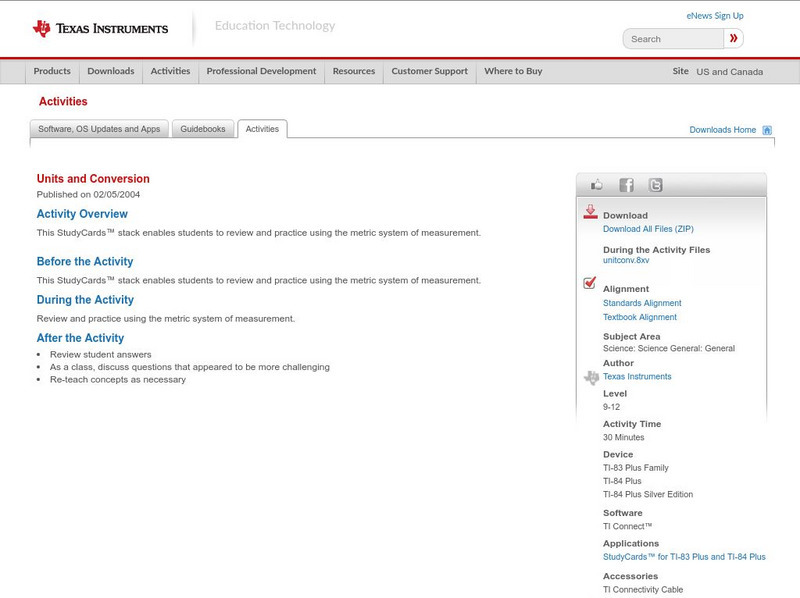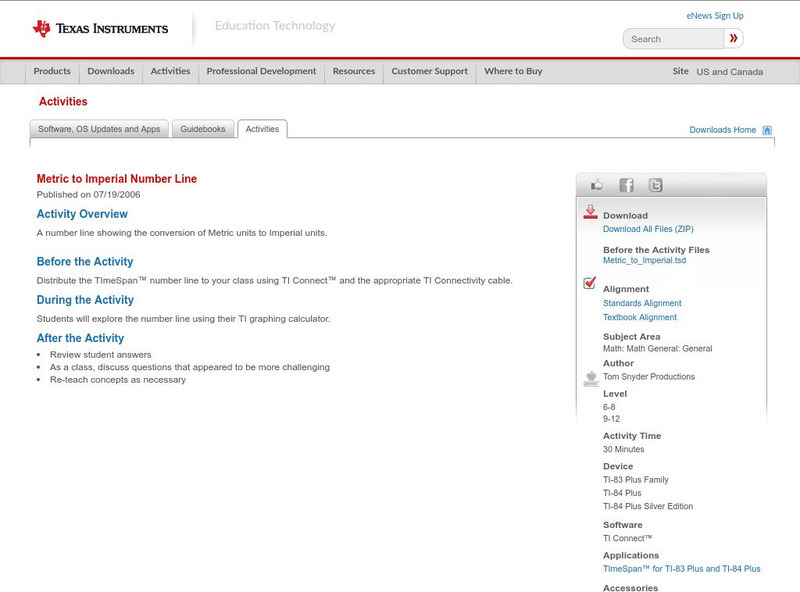Teach Engineering
What is a Nanometer?
Teams learn about the size of a nanometer by measuring objects and converting those measurements. A learning exercise then tests the groups' abilities to use nanometers by having them determine the size of objects that are too small to...
National Nanotechnology Infrastructure Network
Size and Scale – Learning about Measurement
Can you visualize one billionth of a meter? It's not easy to understand the scale of a nanometer. Learners use a hands-on lesson to develop an understanding of the size of a nanometer in comparison to common objects. They walk away with...
Exploratorium
Tired Weight
You don't need a scale to determine weight. This activity provides a way to use the concepts of air pressure and surface area to determine the weight of a vehicle by calculating the amount of weight each tire supports.
NSW Department of Education
Relationships Between Formal Measurement Units: Measure and Record Mass in Kilograms and Grams
Teach the masses about the metric system with this hands-on measurement lesson. Given a fruit or vegetable, learners estimate, measure, and convert its mass using the metric units gram and kilogram.
National Nanotechnology Infrastructure Network
Shrink Me!
The incredibly shrinking meter—decimeters to centimeters, to millimeters, and now to nanometers! Learners may have a difficult time visualizing particles on a nanoscale. Help them see a little clearer using a well-designed lesson...
NASA
Write the Book on Weather Metrics
It's not easy to measure the weather. Pupils learn about what all weather has in common—the atmosphere. Scholars discover how a meteorologists must be able to measure aspects of the atmosphere and decipher the data. They then create a...
Illustrative Mathematics
Paper Clip
With minimal setup and maximum freedom, young geometers are encouraged to think outside the box on a seemingly simple application problem. Though the task seems simple, measuring a given paper clip and finding how many 10 meters can...
National Nanotechnology Infrastructure Network
Scale Models
With instructions to adapt the activities for any grade K-12, any teacher can incorporate the concept of scale into the classroom with a simple, yet effective lesson.
Teach Engineering
An Inflated Impression of Mars
Help your class understand the magnitude of the distance between Earth and Mars with an activity that asks small groups to use balloons to create scale models of the Earth, Moon, and Mars. Class members figure out the distances...
Illustrative Mathematics
How Thick Is a Soda Can I?
The humble soda can gets the geometric treatment in an activity that links math and science calculations. After a few basic assumptions are made and discussed, surface area calculations combine with density information to develop an...
National Nanotechnology Infrastructure Network
What’s In Your Neighborhood?
Chart your way to an understanding of nanoscale. Using a Google map, learners estimate a radius around their location of 1,000 and 1,000,000 meters. Predicting what 1,000,000,000 meters would look like takes them off the charts!...
Teach Engineering
How Big? Necessary Area and Volume for Shelter
Teams must determine the size of cavern needed to house the citizens of Alabraska to protect them from the asteroid impact. Using scaling properties, teams first determining the number of people that could sleep in a classroom and then...
Curated OER
Ant and Elephant
Have you ever wondered how many ants make up an elephant? Inquisitive minds will be amazed as they use scientific notation to compute and compare the mass of an elephant to an ant. Have participants make guesses and see how close they...
Teach Engineering
Human Power
How many humans does it take to power a light bulb? The 10th part of a 25-lesson Energy Systems and Solutions unit has learners conduct an experiment to calculate power. They then use the results to determine how many classmates they...
101 Questions
Retina Display
Learners calculate the pixel density of a specific cell phone using the concept of similarity. They use information from the cell phone's website to make their calculations and then compare their results to the posted information.
National Nanotechnology Infrastructure Network
The Micro and Macro World Around Us
Don't let your eyes play tricks on you ... use scale to keep your eyes in check! Young scholars observe images without scale and try to identify the structure. Then, they look at the same image with a scale bar and assess whether their...
Texas Instruments
Texas Instruments: Units and Conversion
This StudyCards stack enables students to review and practice using the metric system of measurement.
National Council of Teachers of Mathematics
The Math Forum: Intro to Measurement for Primary Students
This site from the Math Forum is a great introduction to measurement for primary students. Each measurement activity has four components: interactive, manipulative-based project; technology; paper/pencil practice; literature connection.
Science Made Simple
Science Made Simple: Area Measurement Conversions
This site allows you to type in an area of measurement you want to be converted. The site converts it for you!
Other
Interactive Learning Paradigms: Volume Unit Conversions
Learn the units of volume measurement. Page includes a conversion calculator, information about the metric system, and numerous links to other relevant material.
Texas Instruments
Texas Instruments: Metric to Imperial Time Line
A number line showing the conversion of Metric units to Imperial units.
Texas Instruments
Texas Instruments: Imperial to Metric Time Line
A number line showing the conversion of Imperial units to Metric units.
Other
Conversions for Weight Measurements
This site allows you to convert weight/mass measurements. For example converting tons to grams. CCSS.Math.Content.3.MD.A.2 Measure and estimate liquid volumes and masses of objects using standard units
TOPS Learning Systems
Top Science: Decimal Bounce [Pdf]
An activity where students learn the meanings of metric prefixes, and how to use them with decimal numbers and with different units of measurement.























![Top Science: Decimal Bounce [Pdf] Activity Top Science: Decimal Bounce [Pdf] Activity](https://static.lp.lexp.cloud/images/attachment_defaults/resource/large/FPO-knovation.png)